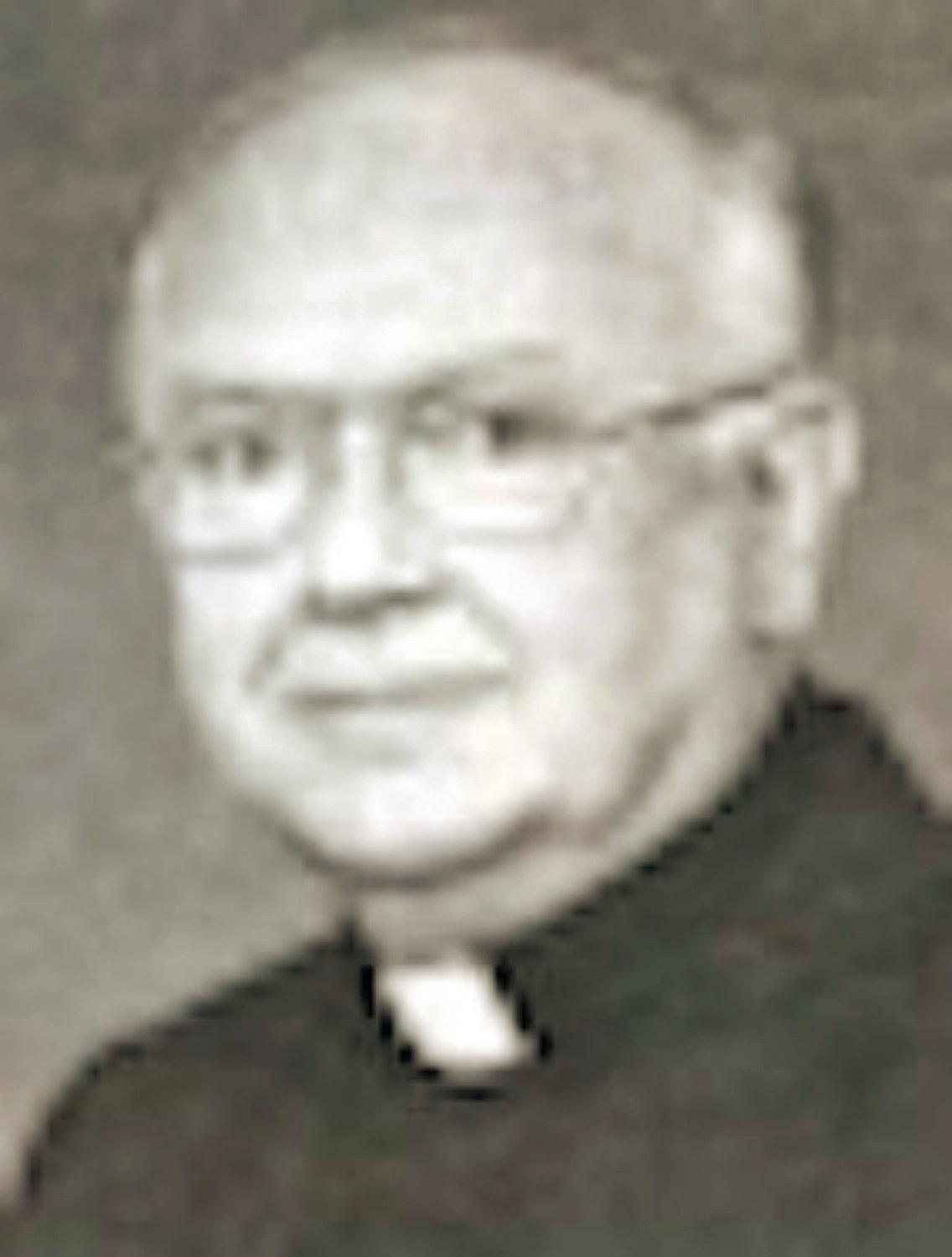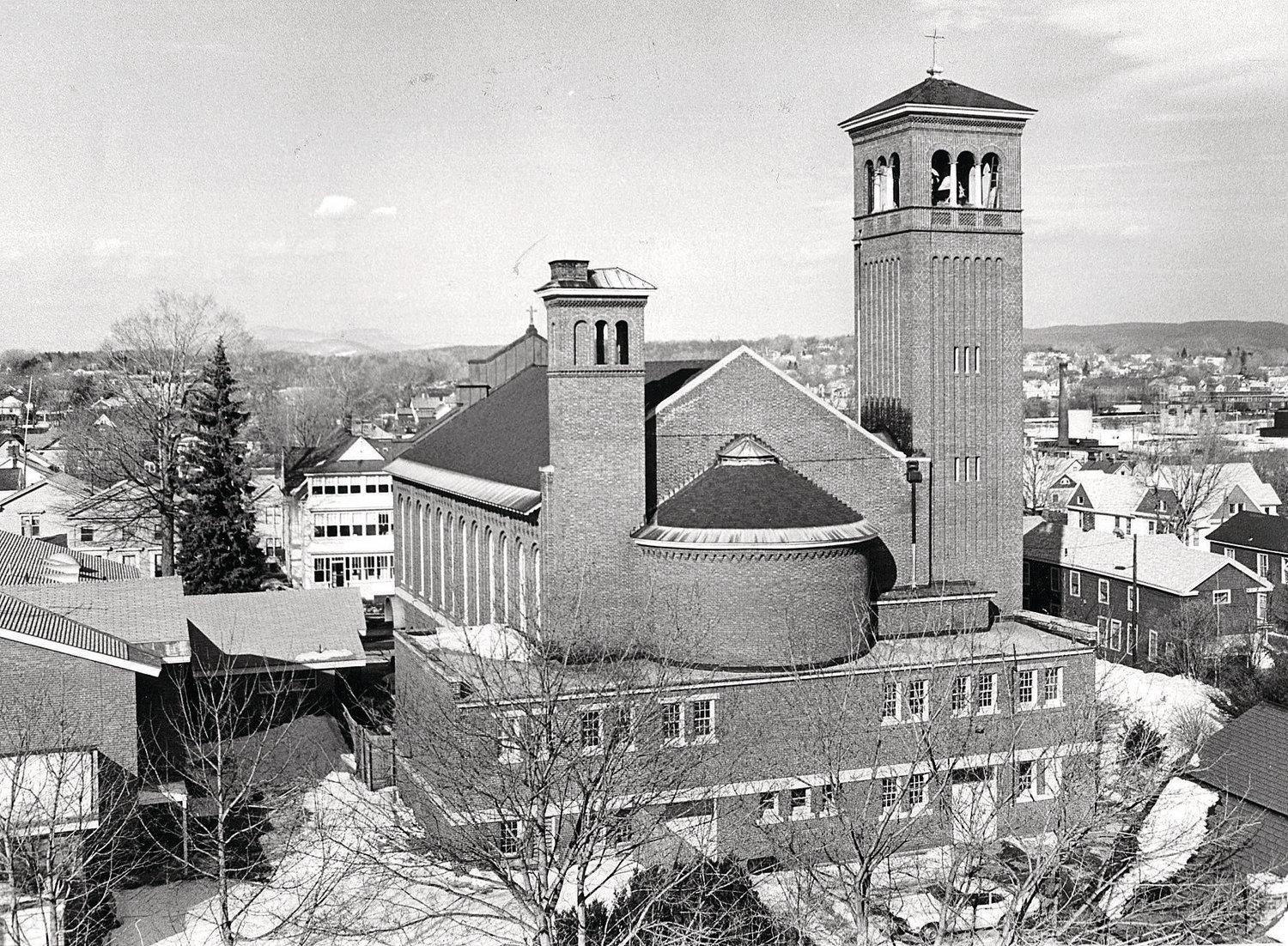|
Accused priest not on the list
By Larry Parnass
Berkshire Eagle
January 13, 2019
https://bit.ly/2TMthym
 |
| The late Rev. Richard J. Ahern. The priest served in Pittsfield for six years and was accused of repeated sexual assaults on children. Despite that, his name does not appear on a list maintained by the Springfield diocese. |
 |
| A view of Mount Carmel Church in downtown Pittsfield in February 1978, three years after the Rev. Richard J. Ahern finished a six-year assignment. Ahern, who died in 2001, is not listed as an abusive priest by the Springfield diocese, despite multiple claims that he sexually abused young people. |
The Rev. Richard J. Ahern isn't on the Springfield diocese's list of clergy who sexually abused young people. But the priest, who served in Pittsfield, died in 2001 with a stack of allegations against him.
A decade after Ahern ended his ministry in Berkshire County, the priest's own religious order prohibited him from hearing confessions from children, sent him to weekly therapy sessions and barred him from the diocese that includes Pittsfield and is now overseen by The Most Rev. Mitchell T. Rozanski.
"This means, then, Dick — that you are not to visit the diocese of Springfield at all," an official with the Stigmatine Fathers and Brothers wrote in a private letter to Ahern in May 1986.
But Ahern's sexual assaults, further documented in court filings and media accounts, did not lead the Springfield diocese to publish his name as an abusive cleric on its website.
Though Ahern served churches in Pittsfield, Agawam, Feeding Hills and West Springfield, the diocese says that, technically, he wasn't their priest.
The Stigmatine letter, made available online by the Bishop Accountability Project, offers a window into a culture of church concealment laid bare more than a decade ago through reporting by The Boston Globe and other news organizations.
But the issue continues to roil the Catholic church, amid new revelations of clergy sex abuse. American bishops gathered this month in Illinois to reflect on the crisis at the urging of Pope Francis, after attorneys general in two states revealed abuses by hundreds of priests.
Next month, Bishop Rozanski will meet with parishioners at a Pittsfield church, part of a four-stop "listening and dialogue" that will, according to the diocese, address the sex abuse crisis.
"These sessions will allow the faithful to make their concerns known, offer observations and ask questions of the Bishop and diocesan officials who will join him," a church statement said.
One possible question: Why is Ahern not on the diocese's published list of "credibly accused" clergy?
It's a question that troubles David O'Regan, a Central Massachusetts man who says he was abused by Ahern at a summer camp in Wellesley in 1962. That was seven years before Ahern arrived in Pittsfield to work on behalf of Our Lady of Mount Carmel. Records indicate Ahern assaulted children before and after his time in Pittsfield. O'Regan believes some victims have yet to come forward in Pittsfield. The Fenn Street church, once attended by the family of the late U.S. Rep. Silvio O. Conte, was among 14 closed by the diocese a decade ago.
O'Regan, who helps lead work by the Survivors Network of those Abused by Priests, or SNAP, believes Ahern's legacy as an abuser needs to be made public. He questions why the diocese does not name Ahern on the list that can be found on its website by searching for "credibly accused."
"He was in charge of altar boys out in Western Massachusetts," O'Regan said of Ahern. "I know of several people who have settlements against him, including an altar boy in Pittsfield, and he told me there are many others."
According to the Bishop Accountability Project, Our Lady of Mount Carmel operated a school with between 150 and 200 students. The year Ahern arrived in Pittsfield, he served as an assistant at the Mount Carmel Church, according to a 1975 story in The Eagle. The Braintree native was ordained in 1954 and had worked for churches in West Springfield and Lynn and in New York and Virginia.
One complaint tracked by the accountability project said Ahern ordered two teens attending a camp to hold another boy down after that youth had taken off his swimsuit; the priest then fondled the child. Another complaint presented to church officials alleged Ahern abused a child while serving as a pastor at Our Lady of Angels Church in Woodbridge, Va.
"The Stigmatine fathers have paid a lot of money to keep people quiet," O'Regan said.
He questioned the Springfield diocese's willingness to shed light on all the abusive priests who worked in its geographic area.
"I've had so many false hopes. I can't believe they are serious now," O'Regan said of the bishop's planned meetings in February and March. The Pittsfield session is set for 6 p.m. Feb. 10 at St. Joseph's Church at 414 North St.
Diocesan policies
Ahern's name would not be published on the diocese's list of abusive priests for two possible reasons, according to Mark Dupont, the diocese's spokesman. One is that the priest died before "credible" allegations were made. The other is that he worked for a religious order, not for the diocese itself.
Dupont said the list of "credibly accused" priests on its website, diospringfield.org, covers only "diocesan priests, removed from ministry, who come under the authority of the Bishop of Springfield."
"Order" priests like Ahern, Dupont said, are the responsibility of different Catholic organizations.
"Under church law only they can make a determination and remove their member from active ministry," he said by email in response to questions. "The diocese can, however, exclude them from having faculties to serve here. The diocese has also, on occasion, provided assistance for counseling services for some of these victims."
The other reason that a priest's name would not appear is if he died before accusations were made public, Dupont said, "and therefore were not afforded the opportunity to defend themselves."
Still, even if an accused priest has died, Dupont said allegations are examined and presented to the diocese's Review Board. If a complaint is deemed credible, the victim is eligible to receive counseling "and a possible monetary settlement."
Olan Horne of Chester, a clergy abuse survivor and advocate for people with claims against the church, said that any Catholic institution interested in confronting the truth of clergy abuse would publish Ahern's name.
"He should be on the site," Horne said. "This is just the walnut game that they play. If we're truly interested in being transparent, it's 'Was he here and was he an abuser?' They don't want names out there."
In the case of Ahern, allegations were indeed made before his death in 2001. The priest spent his last years as administrator of St. Joseph's Hall, a residence in Waltham run by the Stigmatine order.
The Stigmatine order of the Catholic Church was founded in 1816 by an Italian priest. It describes itself as a Catholic religious congregation that provides missionaries who serve bishops. "As Stigmatines, we preach in the Word of God, help in the formation of the Youth and assist in Clergy formation," the order says on its website. The order had been informed of sexual assault allegations against Ahern in 1979, according to court records. The priest has named in a 2006 civil lawsuit filed in Middlesex Superior Court.
A plaintiff, Michael Moe, said Ahern sexually abused him when he was 14 and attending a summer camp in 1969, the same year Ahern was posted to Pittsfield.
The Stigmatine order won that suit because it could not be established that the Catholic group was aware of Ahern's abuse in the 1960s, when two plaintiffs said they were sexually assaulted.
Judge Thayer Fremont-Smith wrote that case law did not allow the suit to move forward. "The earliest evidence in the record as to the Stigmatine Order's awareness of the pedophile activities of any of the priests alleged to have abused any of the plaintiffs, is in 1979, when incidents of wrongful behavior regarding Ahern were brought to the Order's attention," he wrote. That was four years after Ahern was transferred from Pittsfield to St. Anthony's Church in Agawam.
Though the plaintiffs' case was dismissed, the judge noted the church's problems in his 2008 ruling.
"There is no question but that the hierarchy of the Catholic Church has in the past been derelict in its failure to protect innocent youngsters from pedophiliac priests who grievously betrayed their trust," Fremont-Smith wrote, "and that, as a result, no church institution can any longer be above suspicion."
Veiled references in Stigmatine correspondence indicate Ahern engaged in improper behavior after he left Pittsfield. The priest served at the Holy Family in Lynn from 1976 to 1979, within the territory of the Boston archdiocese.
By limiting his assignments, Henchey wrote, the order was trying to help the priest. The letter makes no mention of protecting children.
"This step has been taken to assist you further, by limiting any possible occasion or situation that might be difficult for you. The concern of the Arch-diocese in your regard stems from the difficulties at the parish in Lynn some years ago," the letter says.
Ahern received an order of "limited faculties" from the Stigmatine group in 1988, 1989 and 1990, according to church records linked from the Bishop Accountability Project website. The status restricts a priest's ministerial activity. The measures can prevent a cleric from celebrating Mass or hearing confession.
The Stigmatine order had already restricted Ahern to taking confessions only from nuns. In the order's 1986 letter to Ahern, after his arrival at the retirement home, the Rev. Joseph C. Henchey warned the priest that he was not allowed to visit the Springfield diocese, where he had long worked.
But the warning came only after a warm introduction — and before what seems today to be a conspiratorial closing.
"First of all, I would like you to know that your work for the Missions is deeply appreciated. We are also happy to see that your therapy is proceeding so well — and that you are corresponding so fully to the weekly sessions that have been chartered for you," the letter said.
If Ahern didn't comply, Henchey wrote, the consequences could be dire.
"We plead with you to avoid anything that might create concern or suspicion — as this would place before the Provincial Council the very hard decision of having to move you entirely from the priestly ministry — which no one wants to do," Henchey wrote.
'Open and transparent'
Dupont, the Springfield diocese spokesman, said the way the church responds to the abuse crisis has evolved — and could change further.
"Bishop Rozanski is committed to helping victims as well as safe-guarding as best we can from any repeat of our past failures," he said in an email.
Dupont said the church's response compares favorably to other groups in which employees have committed abuse.
"Our process and efforts, though far from perfect, are still more thorough, open and transparent than in most other institutions, like public or private school systems," he said.
O'Regan, the SNAP activist from Central Massachusetts who said he was sexually assaulted by Ahern in 1962, believes the priest has not been held accountable for his abuse.
"He was in charge of altar boys out in Western Massachusetts," O'Regan said. "My guess is he was sent to some treatment center."
With a new listening tour planned by Bishop Rozanski, O'Regan said his group remains focused.
"Our mission has never changed. That's to heal the wounded, expose corruption and make the world a safer place for children."
"It's very, very hard for them to come forward and speak out because of the nature of the crimes committed against them," O'Regan said. "They need to realize they are not alone and there are people out there who understand."
Contact: lparnass@berkshireeagle.com
|

